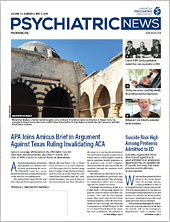Adolescents and young adults who take amphetamines for attention-deficit/hyperactivity disorder (ADHD) have twice the risk of developing psychosis compared with their peers who take methylphenidate, research published in the March 21 New England Journal of Medicine has found. The study also found that nearly four times as many patients received a prescription for amphetamine in 2014 as in 2005—even though the Food and Drug Administration (FDA) changed the labeling for stimulants in 2007 to reflect the risk of psychosis in children and adolescents without prior history of psychotic illness.
“When looking at prescribing trends, I was astounded that in this age group, when people are at risk of developing psychotic disorders, amphetamine prescribing [rose] four times as high,” lead author Lauren V. Moran, M.D., told Psychiatric News. Moran is an assistant professor in the Department of Psychiatry at Harvard Medical School and a psychiatrist at McLean Hospital in Belmont, Mass. “What makes it concerning is that although the events were rare, you see this large increase in Adderall, and you see an associated increased risk for psychosis.”
Moran and her colleagues analyzed claims in two large health care databases for 110,923 patients aged 13 to 25 years who were prescribed amphetamine for ADHD and the same number of patients who were prescribed methylphenidate. The primary outcome was a new diagnosis of psychosis for which an antipsychotic medication was prescribed within the first 60 days of the onset of psychosis. Among 343 episodes of psychosis, 106 occurred in patients taking methylphenidate, and 237 occurred in patients taking amphetamine.
“Although the overall incidence of psychosis was relatively small in the population studied, the findings are clinically meaningful given the frequency with which these medications are used,” said David Fassler, M.D., a clinical professor of psychiatry at the Robert Larner, M.D., College of Medicine at the University of Vermont, who was not involved in the research. “They also underscore the importance of evaluating potential risk factors for psychosis before initiating treatment for ADHD.”
Moran noted the importance of close follow-up to see how patients respond to their medications. “See your patients every month early on in treatment. Although rare, these events happened in the first several months of treatment. Then, after the patient has been on [the medication] for a long time, you can space out visits more.”
In a secondary analysis, the researchers found there was a higher risk of psychosis with amphetamine than with methylphenidate among patients treated by family medicine physicians, internal medicine physicians, or pediatricians, but not among those treated by psychiatrists.
“Psychiatrists might see a patient a little bit differently and may be able to pick up on prodromal syndrome and [therefore] not put patients on a stimulant, or stop stimulants right away,” said Moran.
Moran said that there is no need to disrupt treatment with amphetamines for patients who have responded well. “If patients are on Adderall for a long time and they find it to be helpful, they are using it correctly, and they’re taking it as prescribed, you don’t need to take them off.”
The researchers noted that the study had several limitations, including the possibility of underreported substance use disorders. They also did not know whether the patients took their medications as prescribed or whether any of the patients diverted their medications.
This study was supported by the National Institute of Mental Health. One of the study’s co-authors was partially supported by the Patient-Centered Outcomes Research Institute, the National Institutes of Health, and the FDA. ■
“Psychosis With Methylphenidate or Amphetamine in Patients With ADHD” can be accessed
here.

